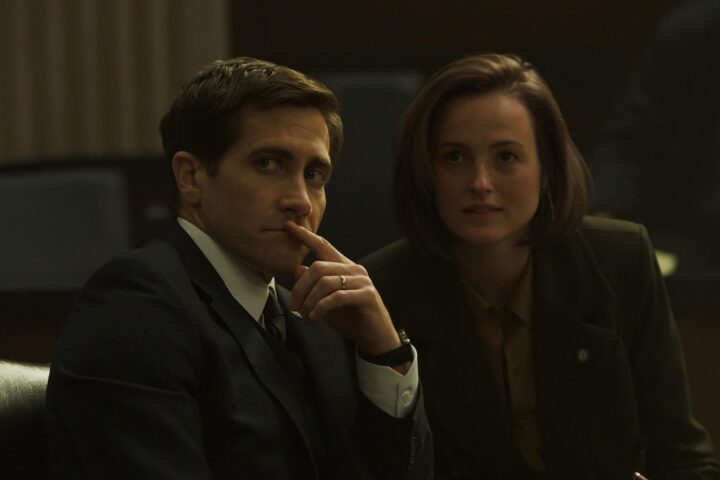Tim Fehlbaum’s September 5 follows the ABC Sports team that covered the armed attack by the Palestinian militant group Black September during the Munich 1972 Summer Olympics that resulted in the deaths of 11 Israeli Olympians. It’s a crisis freighted with geopolitical significance, but Fehlbaum and co-writer Moritz Binder seem almost desperate to avoid engaging with it. Still, the sympathies of September 5 do seem readily apparent. This is a film about a story with clear victims and clear perpetrators, being sold to a global audience by a group of well-meaning American journalists who happened to be caught in the fray.
September 5 is a journalism procedural that’s only impressive for its taut, docu-realistic depiction of a 17-hour ordeal as it affected the members of the ABC Sports crew on the titular day. Roone Arledge (Peter Sarsgaard) is being relieved for the night by rookie TV producer Geoffrey Mason (John Magaro) when the Black September militants take most of the Israeli Olympians hostage. Their demands: Israel must release some 200 Palestinian prisoners in exchange for the Olympians, or else one athlete will be executed on the hour, every hour.
With only golf and minor league baseball coverage under his directorial belt, Mason is thrust into an extremely tricky situation, as there are no other American news crews in Munich and ABC’s higher-ups aren’t convinced of the severity of the situation. To assist him is operations manager Marvin Bader (Ben Chaplin), the ABC crew’s lone Jewish employee, and a translator, Marianne (Leonie Benesch), who’s tasked with improvising on several jobs, partly because she’s the only one who knows German and partly, it seems, because she’s a woman. The responsibility of the hour seems clear: get cameras as close to the Olympic Village as possible and supply Peter Jennings (Benjamin Walker) and Jim McKay (depicted in actual footage) on mic with information on the ground, with or without confirmation, to relay to TV audiences.
Because the ABC brass stateside seems to think that Mason and his crew are in over their heads, the fulfillment of their noble journalistic “responsibility,” a term that’s bandied about ad nauseam with ever-increasing gravitas, plays out as something akin to a heist operation. Here, there are quick cuts of journos and technicians lacing cables and wires, retrofitting speakers and walkie-talkies, clandestinely rolling out in-studio cameras to the field by the Olympic Village.
If the film presents Israel as an innocent actor being preyed upon by Palestinian aggression to satisfy the real-time limitations of its script, it comes largely at the expense of ideological nuance. A notable exception is a tense moment in which Jennings suggests, over the phone, that ABC avoid the word “terrorist” when something less fanged would do, only for Mason and company to ignore his recommendation when they hear German radio freely using the term.
Elsewhere, Bader’s Jewish identity comes up once in a three-line exchange with Marianne, whose experiences with sexism are briefly touched on. More interesting, though, is the assertion that the German government is desperate to portray an image of itself saving the Jews—a public relations reversal of their Holocaust past—but this, too, is given extremely short shrift.
There’s an opportunity here for a larger discussion of the use of violence in political struggle, and the entrenched media-based predilection for assigning terrorism as a label on certain entities but not others. The film, though, isn’t interested in anything that would detract from providing audiences with the sustained pleasure of watching a clock-ticking thriller.
September 5 invokes Arab identity and the transference of guilt from the Germans to the Arabs but is uninterested in actually exploring what that materially means, which may help to keep the gears turning smoothly but is politically unserious. And it is, no doubt, purposeful. As Sarsgaard’s Roone off-handedly remarks early in the film about the decision to have McKay ask Mark Spitz, the legendary swimmer and a Jew, about the Holocaust, “it’s not about politics; it’s about emotions.” Someone should tell the filmmakers that emotions are highly political too.
Since 2001, we've brought you uncompromising, candid takes on the world of film, music, television, video games, theater, and more. Independently owned and operated publications like Slant have been hit hard in recent years, but we’re committed to keeping our content free and accessible—meaning no paywalls or fees.
If you like what we do, please consider subscribing to our Patreon or making a donation.






You completely missed the point of this movie, or, rather, want to make it into an entirely different movie. This movie isn’t about a geopolitical situation — it’s about how one set of broadcasters went about dealing with it. It’s a process story. Think of it like The Hunt for Red October….that movie doesn’t go deeply into the intricacies of US-Russian relations.
I’m not suggesting your movie wouldn’t be worthwhile, too, but this movie has a specific, limited focus, which I for one, found made it more compelling. I love a good process story, and this one definitely fit the bill.